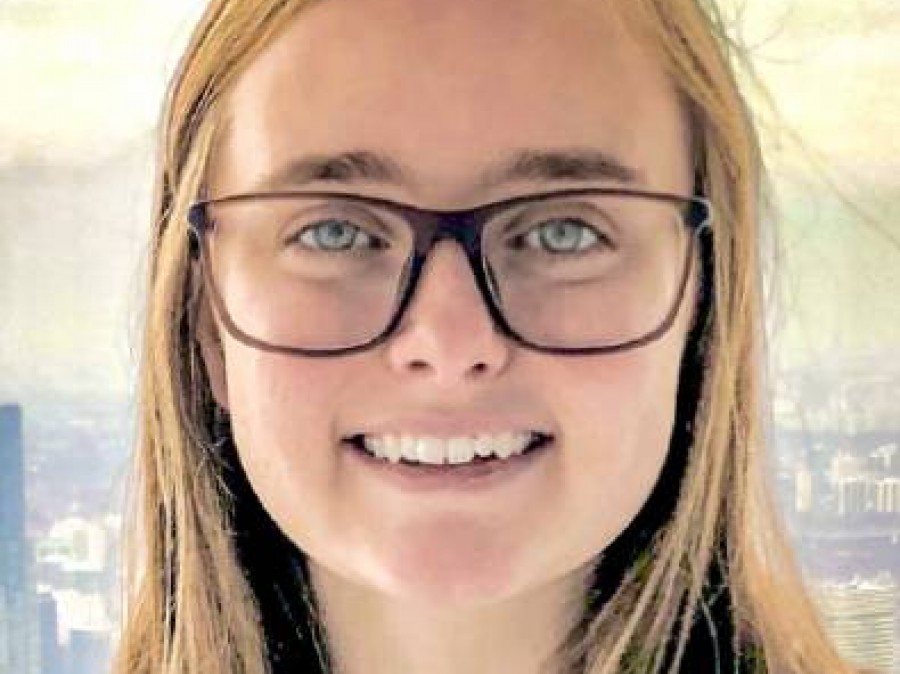German certificate student Sydney Hughes '22 named Sachs Scholar

Certificate student Sydney Hughes ‘22
The Sachs Scholarship is intended to broaden the global experience of its recipients by providing them with the opportunity to study, work or travel abroad after graduation. It was established by classmates and friends of Daniel Sachs, a distinguished Princeton student athlete in the Class of 1960, who attended Oxford as a Rhodes Scholar. Sachs died of cancer at age 28 in 1967. The award is given to those who best exemplify Sachs’ character, intelligence and commitment, and whose scholarship is most likely to benefit the public.
Hughes, from Mahopac, New York, has committed herself to addressing the climate crisis in ways both large and small. At Princeton, she is concentrating in chemical and biological engineering and pursuing certificates in sustainable energy and German.
She plans to use her Sachs Global Scholarship to spend two years at the Technical University of Munich, Germany, working with one of the world’s leading hydrogen fuel cell research teams. She hopes to help tackle the challenges of developing cheaper, more sustainable catalysts for use in fuel cells and in the electrolysis process that produces hydrogen fuel.
“Climate change is a global crisis, and my goal with both my career and with a Sachs Global Scholarship is to contribute to its solution,” Hughes said in her application essay. “Climate change causes wildfires, droughts, sea level rise, and species extinction, which jeopardize human health, water and food resources, and the future of our ecosystems. “To mitigate climate change, we will need to expand and improve current sustainable energy sources to accelerate the transition away from fossil fuels.”
Richard Register, the Eugene Higgins Professor of Chemical and Biological Engineering, said Hughes is an “exceptional candidate” for the Sachs Global Fellowship.
“Sydney has a strong dedication to the public interest through the development of a carbon-free energy infrastructure,” he said. “Though the overarching goal of an extended-lifetime catalyst for hydrogen fuel cells is a challenging one — and will certainly not be solved by one person in one year — Sydney is well poised to advance this project during her time at TUM. She will be able to leverage world-leading expertise and facilities there — but more importantly, Sydney brings her own perspective, background and skills to the project.”
While in Munich, Hughes also plans to immerse herself in German language and culture through nature conservancy work and community gardening.
“My devotion to [conservancy work] comes from of a desire to work towards improving our environment from both in the lab and in landscapes themselves. These are intertwined, and a solution in one, like innovations in hydrogen, cannot mitigate climate change without the other,” she said.
After her Sachs project in Germany, Hughes said she plans to bring back to the U.S. her knowledge of how fuel cells can be improved to make them a viable means of powering transportation.
“My experience in the Germany, where fuel cells are being innovated and play a large role in climate policy, will give me an understanding of a potential fuel cell future that I will keep with me through my career and share with others along the way,” she said.
Hughes has already completed a number of internships related to chemical engineering, including for American Energy Technologies Company, the Technical University of Darmstadt in Germany and the Genesis Project. She also was a laboratory intern for the Complex Fluids Group led by Howard Stone, the Donald R. Dixon ’69 and Elizabeth W. Dixon Professor in Mechanical and Aerospace Engineering.
On campus, she is director of campus events for the student organization Princeton Energy Association and organized the Princeton Energy Case Competition for high school students to present ideas on sustainable solutions to energy problems in New Jersey. She is president of the Princeton University Gymnastics Club, a peer academic adviser in Rockefeller College and a member of the Princeton Conservation Society.
Her awards include the Tau Beta Pi National Engineering Honor Society and a DuPont Senior Thesis Fellowship Grant.




